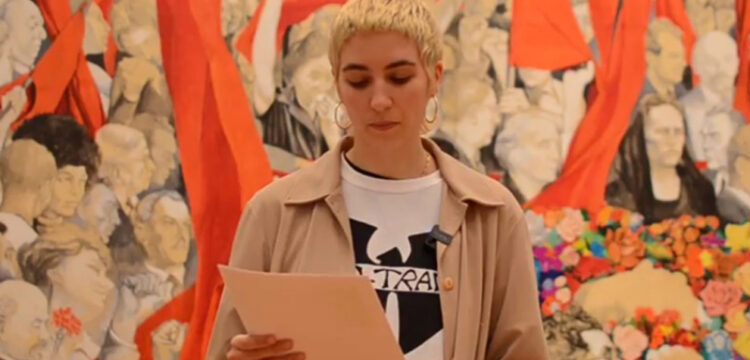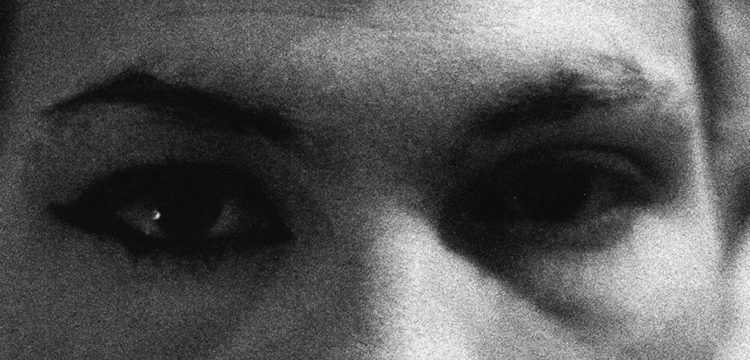Queer Dada
Are you tired of gazing at yourself in endless Zoom meetings?
Are you sick of the flatness of the Brady Bunch style?
Do you dream of ways out of our daily digital boredom?
Are you appalled by yes or no answers, by black or white pronouncements, by good or evil evaluations?
Are you wondering why the world is divided into the binaries of this or that, up or down, male or female and the zeros and ones of binary code?
Do you dream of escaping from classification, quantification, and the tyranny of metrics?
Do you want to free yourself from binaries and binary codes?
Come join Queer Dada, an ode to fluidity, a celebration of creativity Dada-style.
Queer Dada is a live performance featuring queer, non-binary and trans-human creatures from across nations, genders, and the intersections that make up the human species.
It is a trans-space inhabited by artists reaching out from beyond cultural boundaries, gender binaries and the violence of the Anthropocene.
Queer Dada is hosted by Comm·e the robot, who will be live-possessed by artists performing remotely from Brazil, the US, the Netherlands, Jordan, and Italy. In compliance with safety protocols to contain the spread of Covid-19, Comm·e shall be in the company of one human only, System Hardware Abnormal, who will play live music from the empty Aula Magna at John Cabot University in Rome.
Respecting social distancing rules, with the help of mighty trans creatures, we pay a tribute to queerness and the fluidity of dada, in defiance of a quantified and sad world of metrics, binaries and binary codes.
You can follow the event at this link. Today, at 6pm CET.
For further information you can send an email to: [email protected]
The following are short excerpts, pills to pre-taste before the performance. We would like to thanks the authors for sharing them with us.
Ten Reasons to Sell Your Ass Online
by Drew Pham
“I.
I have touched many lovers & won’t touch another
like a burrowed tick,
refugees flee
to murder months underground
outside—cats yowl
trees blooming mate
without shame
II.
Boi lovers
I made them press me to the wall
legs, torso-wrapped
see me off to war
I’ll come
not home
not lover
not yet
doesn’t call
& I don’t mind if he never will”
Hi Tech Trichomonas
by System Hardware Abnormal
“With the upcoming atrophy of the human species’ sexual desire, the protozoa will take the lead of all reproductive intercourses, but look out—there’s an obstacle in their conquest of humanity, that stands right before their take of the total power: will they know what it means to love or will they be also left unaware in darkness?”
Gossip, Shimmer, and Milk
by Simon(e) van Saarloos
“I heard about ‘something’ on my first visit at The Institute and, during the three months that I was there as an artist-in-residence, the stories kept circulating. Often ‘something’ would be introduced as ‘have you heard about the building?’ Some people quieted their voice, others spoke with ridicule about sensitive people, some were frustrated and angry. The ghosts I hoped to find sounded like gossip.
Something was haunting the building. Supposedly ten people had broken their ankle falling down the hallway stairs. The stairs were made of a spotty grey stone, which made it difficult to see depth and differentiate each step. I couldn’t find anyone who had actually broken their ankle. There were headaches from a too abrupt change of light between the lab and the corridor, there were nose bleeds caused by unusually low levels of humidity, people had fainted because the windows didn’t open. A subcontractor failed to notice a gas leak in the lab.
The ‘something’ was the most difficult to narrate. Eventually, after more than two years of negligence or continuous testing—depending whose perspective you hear—a potential cause was found and, most importantly in this scientific context, proven: an expert measured the hertz level, and low frequency noise was detected. The effects of low frequency noise are debated, but supposedly ten percent of the total population is physically affected by this absent/present soundwave.”
Behold, the Enduring Pyschosexual Power of Jeff Goldblum
by Raphael Amahl Khoury
“You know what’s impossible about doing theatre?
everything! every single thing!
I mean apart from the impossibility of making a living
there are impossible aspects of theatre which I find amazing
I think theatre is far more high-tech than cinema
It’s impossible for someone to literally transform into another person right in front of your eyes or for you to be transported to another space within minutes
without any editing
without special effects
What’s more high tech than theatre?
in very ancient times theatre people were the ones
who would tell stories
and channel ancestors
who would get into a trance and communicate with spirits
we would heal the sick
and move herds of antelope
and bring rain
and calm social unrest
and it worked
I mean it must have worked
for thousands of years
otherwise those traditions would not have survived
right?
I mean after the first couple of failed rain dances
the medicine man or woman would have been fired
don’t you think?
I’ve seen photos of rain dances up until the 1950s
we made impossible things possible
I always wanted to be an actor
and here I am doing it now
Antonio Machado says
‘In order to write poetry, you must first invent a poet who will write it’
and
Carl Sagan said If you wish to make an apple pie from scratch, you must first invent the universe. Thats kind of what I feel I did
in order to become an actor
I had to first write plays in which people me like existed
so I became a playwright and created those worlds”
Voice Notes
by Allison Grimaldi-Donahue
Who would even think of saying that the jellyfish is “cause” of the wale, or even that the sea is “cause” of the flower? No, they are simply two more or less remote zones of the same substance. The same goes for the objects of history: some are not the causes of others, they are merely the different moments of the same stem. —Roland Barthes, Michelet
“ahh ahh ahh ahh ahh ahh ahh
repeat
ahh ahh ahh ahh ahh ahh ahh
on the telephone, cord stretching over the ravine
ahh ahh ahh ahh ahh ahh ahh
i slide down my cords, and you slide into love
from where i call the mobile doesn’t work
from where i’m standing all your words are blending together
stuffing coins into slots, arcade game frogger love
feed my boca until it spills over love
waiting for the big win, candy floss tiger texture love
shooting the water gun into the clown’s mouth
i feel a jolt at the back of my throat
violent surprise cold and acute
ahh ahhh ahh ahh ahh ahh ahh”
FLOR
by Natalia Polasso, an excerpt from Amora (2020, Amazon Crossing)
“Her hair spilled over her shoulders, and she was always in a hat and canvas shoes, which may have been why she reminded me a bit of Renato Borghetti, that folk singer with the accordion. Whenever I think of that time and of that place and try to remember people’s faces, or their voices, she’s the one I picture most clearly.
It was 1988, but thinking of it now, it seems like it could’ve been much earlier. Opposite my house stood Mr. Kuntz’s shop, with its dirt floor and exposed brick walls. That’s where I spent most afternoons, with Celoí, Mr. Kuntz’s daughter. Celoí’s mom had died in childbirth, which made them, Celoí and Mr. Kuntz, a very serious pair. I liked going there because it was right in front of my house and because Celoí had Xuxa’s latest album — the one with “Ilariê”, “Abecedário” and “Arco-íris” — and we’d dance to it in front of her dad’s store until six thirty at night, since we knew the transformer on the street always blew at seven. Seven p.m., without fail. The transformer probably couldn’t handle all the people watching telenovelas, taking showers, switching their radios on, using their blenders, and god knows what else, all at the same time, so it’d start crackling and sparking until boom! For a few hours, no one had electricity and it was like we lived in a far-flung Amazonian village. There were no sidewalks and the cobblestones in the street were totally uneven, which cost all us kids plenty of toenails since that’s where we learned to play soccer and to bike, and where we would dance to the latest hits. Not bad for a modest neighborhood on the border of Campo Bom and Novo Hamburgo.
Our house sat between two garages: the Klein family’s — a dad, a mom and their little daughter, all blond with alarmingly blue eyes, whose names I can’t really remember — and on the other side, the one run by the most striking figure of my childhood, a woman whose face I saw only once, but never forgot. Both garages had a decent enough clientele, but there was a sort of tension between the two shops that seeped through the walls of our house from both sides.”

The event is organized by the Communications Department at John Cabot University and it’s part of the lecture series Digital Delights and Disturbances.





